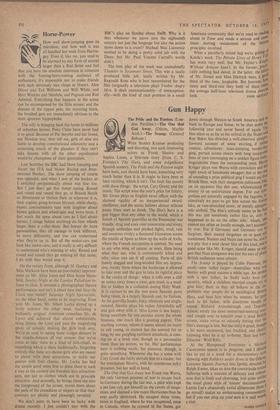Horse-Power
How well show-jumping goes on television; and how well it was all handled last week from Harrin- gay. Even if, like me, you tend to be alarmed by any form of animal larger than a Red Setter and feel that you have the absolute minimum in common with the hunting-horn-tooting audience of enthusiasts, it's impossible not to make friends with such obviously nice chaps as Messrs. Alan Oliver and Ted Williams and Wilf White, and Herr Winkler and Nizefela, and Pegasus and Red Admiral. Everything that happens in the arena can be encompassed by the little screen; and the dramas of the tipped pole, the wavering brick, the brushed gate arc immediately obvious to the most ignorant hippophobe.
The telly is bringing back the horse to millions of suburban homes. Pony Clubs have never had it so good. Because of Pat Smythe and her breed, out Hendon way, they tell me, girls of nine are liable to develop constitutional inferiority and a screaming attack of the glanders if they can't take lessons with all the other equidazzled would-be champions of their generation.
Last Saturday the BBC had Show Jumping and Ascot; the ITA had Motor Racing and Inter-
national Hockey. The show jumping of course was splendid; and what I saw of the hockey as I switched peripatetically about was fine too. But I just don't get this motor racing. Round and round and round they go, at Brands Hatch or Silverstone or Oulton Park or wherever it is, their engines going brruum brruum, while chatty, expert commentators roar with laughter about blown gaskets and wheel-spin and worn tyres. I feel much the same about cars as I feel about horses; I cringe before anything on four wheels larger than a roller-skate. But horses, do have personalities, they all manage to look different, to move differently, and you can understand what they're up to. But all the motor-cars just look like motor-cars; and it really is very difficult to understand who's winning or why. Round and round and round they go making all that noise; I do wish they would stop it.
On the variety front, although M. Guetary and Miss Markova have been an (inevitable) improve- ment on Mr. Allan Jones and Miss Jayne Mans- field, Sunday Night at the London Palladium re- fuses to Click. It remains a photographed theatre performance; and isn't it about time that Stop the Clock was rested? Saturday Night Spectacular, on the other hand, seems to be improving. Even with Mr. Jones, Mr. Albert Locke stirred up a lively mixture the other week (including a brilliantly original American comedian Mr. de Lyon) and achieved that almost unbelievable thing (praise the Lord and pass the magnifying glass) of actually making the girls look sexy. We're so used to seeing those midget dancers in the middle-distance of our screens that we've come to take them as a kind of folk-ritual, as something which is there traditionally, forgetting entirely that these are chorus girls who are meant to please with their attractions, to tickle our palates with their charms. Mr. Locke has had the simple good sense first to dress them in such a way as' the camera can translate into attractive- ness, not just in clothes which are in principle attractive. And secondly, he brings them out into the foreground of the screen, strews them about the path of his comedians or singers so that their contours are plainly and pleasingly revealed.
We don't seem to have been so lucky with drama recently. I just couldn't stay with the BBC's play on Sunday about Swift. Why is it that whenever we move into the eighteenth century not just the language but also the action slows down to a crawl? Michael Mac Liammoir seemed to be doing a pretty solid job with the Dean; but Mr. Paul Vincent Carroll's words didn't.
The best play of the week was undoubtedly Thunder in Sycamore Street. This was a tautly produced little job, tautly written by Mr. Reginald Rose who is best remembered for the film (originally a television play) Twelve Angry Men. It dealt unexceptionably—if unexception- ally—with the kind of race problem in a small American community that we're used to reading about in Time and made a serious and sonic- times moving restatement of the hull° principles involved. What a peculiarly mixed bag we're getting elf Korda's work. The Private Lives of Henry 1111,, has worn very well; but Mr. Feyder's K"1 Without Armour hasn't. In the former, Prectr cally nothing had dated; in the latter, the artsd of Mr. Donat and Miss Dietrich were, a go .„ third of the time, laughable. But heavens, her tinny and third-rate they both of them Make the average half-hour television drama exercise


































 Previous page
Previous page